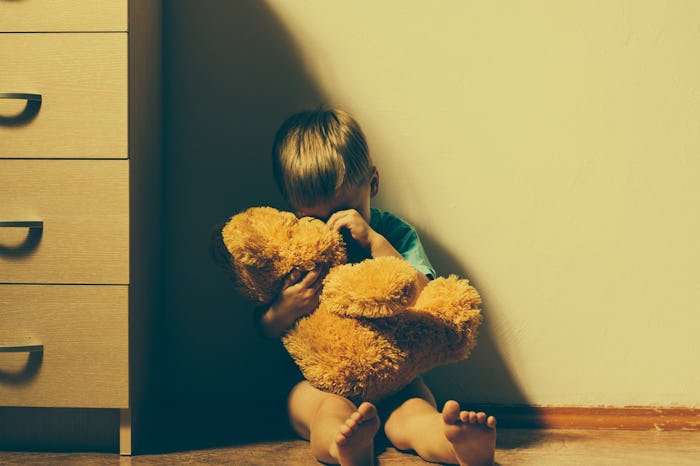It's so easy to be on the outside looking in when it comes to discipline and parenting. I know I've seen my share of tantrums in stores that seem unreasonable (which makes sense, because tantrums are rarely all that reasonable) and if I hadn't had kids of my own, I might not have understood. I might not have understood that each kid is different, with different needs and different responses to different types of discipline. While parents struggling with behavioral issues might get understandably frustrated with their kids, a new study suggests that harsh parenting isn't helping kids who have ADHD (attention deficit hyperactivity disorder) and other forms of discipline may be more effective.
The study conducted by Ohio State University looked at 99 preschool children who struggle with ADHD to better understand how parenting affects their behavior. According to WebMD, ADHD is the most commonly diagnosed mental disorder in children in the United States, and children with ADHD tend to have several behavioral traits that can make parenting more difficult.
Kids who have ADHD tend to have difficulty controlling their impulses, are hyperactive and have a hard time staying still, and have trouble paying attention — which can impede their home life and school life in equal measures. ADHD is generally discovered during the preschool years, and is more common in little boys than in girls, the site notes.
Researchers who took part in the study, which was published in the Clinical Psychological Science, looked at the emotional backlash of harsh disciplinary tactics, like yelling and physical discipline, by studying the children before and after parents were exposed to parenting coaching sessions. Prior to the parenting coaching sessions, parents and their children were recorded playing an intentionally frustrating block building game together to see how they interacted. The children were tethered to equipment to test their heart activity.
After the initial observation, parenting sessions were conducted over a period of 20 weeks, offering parents helpful tools and positive parenting techniques to strengthen the family relationship. The children were also sent to family therapists for the same duration. According to Theodore Beauchaine, the study's lead author and professor of psychology at Ohio State University, said in a press release of the findings published in Science Daily:
This is the first study to show that improved parenting changes kids biologically. The idea is to change family dynamics so these highly vulnerable kids don't run into big problems down the road, including delinquency and criminal behavior.
Once the parents had completed the 20-week sessions (or 10-week in some cases, though it should be noted the parents who took part in the 20-week course saw greater results), families were again observed interacting with their children. This time using positive parenting techniques like praising their children, encouraging them with positive reinforcement, and helping them with problem-solving. Beauchaine noted that the children, who were again tethered to heart monitors, were found to have improved biological functions with the more positive parenting.
It probably does not come as much of a surprise that children tend to respond better with positive parenting, and Beauchaine noted that parenting children with ADHD is incredibly difficult. He told Science Daily:
A lot of times, these young kids and their parents don't like each other much. We strive to change that. It's challenging for parents, because these kids can be hard to raise. The idea is not to blame parents or kids, but to look for ways to help them both.
With that in mind, Very Well offers eight key discipline strategies to help parents cope with a child who has been diagnosed with ADHD:
- Provide positive attention: as exhausting as it can be to find the energy to play with a child who has higher needs, setting aside 15 minutes a day can be a way to reconnect with each other
- Give effective instructions: giving one simple instruction at a time will make it easier for your child to stay focused
- Praise your child, because everyone wants to know they've done a good job
- Time-out: encourage them to seek out a quiet spot and engage in some deep breathing exercises if they are getting overwhelmed
- Ignore small issues
- Come up with a reward system that will help them have something to work towards
- Allow for natural consequences; instead of forcing your child to eat his dinner, perhaps letting him get hungry later and coming to the conclusion that he should have eaten on his own will help
- Work with the teacher, and any other adult who takes care of your child
As with most parenting, consistency is key. But that doesn't mean it's easy, so be kind to yourself. And maybe allow yourself a small time-out now and then, to recharge your batteries.
Watch Romper's new video series, Romper's Doula Diaries:
Check out the entire Romper's Doula Diaries series and other videos on Facebook and the Bustle app across Apple TV, Roku, and Amazon Fire TV.
